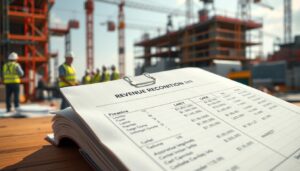Construction Accounting: Understanding Construction Financial Management
The construction industry is uniquely challenged by its project-based nature, each project bringing its own set of financial hurdles and solutions. This project-based nature leads to a high failure rate, slow payment times, and inconsistent cash flow.
For construction companies, accurately tracking costs, revenues, and financial data is key to efficiently managing resources and maintaining cash flow. Construction accounting stands apart from traditional accounting due to decentralized production, inconsistent vendors, retainage in contracts, and irregular cash flow cycles.

Understanding construction accounting is vital for growth and sustainability in the industry. Effective financial management involves budgeting, cost control, cash flow management, risk mitigation, and leveraging technology for optimal project outcomes. The challenges in construction accounting include variable project costs, long project durations, regulatory compliance, and intricate job-costing processes that demand detailed tracking and reporting.
To overcome these challenges, meticulous budgeting and the use of real-time accounting software for accurate tracking are essential. Adopting flexible financial strategies, staying updated on regulations, and implementing integrated accounting systems for precise job costing are also crucial. By adhering strictly to construction accounting standards, companies can gain a competitive edge, build trust with stakeholders, and protect their financial health and project success. Collaborating with specialized accounting firms ensures compliance with the latest standards and positions clients as leaders in financial management within the construction industry.
What is Construction Accounting?
Construction accounting is a specialized form of project-based accounting. It helps construction companies manage their financial aspects effectively. This approach is tailored for the unique challenges of the construction industry.
Construction Financial Management Accounting Definition and Overview
At its core, construction accounting tracks and reports financial transactions related to construction projects. It monitors revenues, expenses, and profitability for each project. A robust construction accounting system provides valuable insights into financial performance, aids in decision-making, and ensures regulatory compliance.
Key Differences Between Construction Accounting and Traditional Accounting
Construction accounting shares some similarities with traditional accounting but has distinct differences. A major difference is the focus on job costing. Construction companies assign costs to specific contracts, setting up separate jobs in their accounting system. This method allows for precise tracking of expenses and revenues by project.
Another key difference is the job cost ledger. This ledger records project-specific costs, like materials, labor, and equipment. Detailed records in the job cost ledger help construction companies assess project financial status and adjust for profitability.
Common Accounting Methods Used in Construction
Construction companies can choose from various accounting methods based on their needs. Common methods are:
- Cash method: Recognizes revenue and expenses when cash is exchanged.
- Accrual method: Records revenue and expenses when earned or incurred, regardless of cash flow.
- Percentage of completion method: Recognizes revenue and expenses based on project progress.
- Completed contract method: Recognizes all revenue and profit after project completion, used for uncertain projects.
| Accounting Method | Revenue Recognition | Expense Recognition |
| Cash Method | When cash is received | When cash is paid out |
| Accrual Method | When earned, regardless of cash receipt | When incurred, regardless of cash payment |
| Percentage of Completion | Based on project progress | Based on project progress |
| Completed Contract | Upon project completion | Upon project completion |
Understanding construction accounting’s unique aspects helps construction companies manage finances effectively. It includes the definition, differences from traditional accounting, essential terms, and common methods. This knowledge forms a strong foundation for financial management and decision-making.
The Importance of Specialized Accounting in Construction
The construction industry faces distinct financial hurdles that demand specialized accounting methods. These hurdles include project-based production, decentralized operations, inconsistent vendor contracts, and retainage. As a result, construction firms often grapple with irregular cash flow and complex financial management.
Unique Financial Challenges in the Construction Industry
Construction accounting diverges significantly from traditional accounting. It emphasizes project-level financial data, focusing on cash flow, current ratio, and retainage. Managing cash flow is crucial due to project length and funding needs. Accurate cost estimation is vital to avoid budget overruns and delays.
The Role of Accurate Accounting in Project Success
Accurate accounting is key to construction project success. It provides real-time insights into costs, revenue, and profitability. This enables efficient financial control, allowing managers to make proactive decisions and address issues early. Proper accounting ensures resource allocation is efficient, reducing waste and boosting project efficiency.
Compliance and Regulatory Requirements
The construction industry faces numerous compliance and regulatory demands, especially in labor and payroll. Workers on federally funded projects must earn prevailing wages set by the U.S. Department of Labor. Union payroll includes specific rates, deductions for dues, and fringe benefits like pension and health insurance. Adhering to these labor laws is crucial to avoid penalties.
Specialized construction accounting software is vital for payroll management, tracking employee time and expenses across various sites, and generating precise reports. This software must support local, state, and federal payroll regulations to ensure compliance and accurate wage payment.
Impact of Specialized Accounting on Financial Decision-Making
Specialized construction accounting facilitates more informed financial decisions. It provides accurate and timely financial data, aiding companies in optimizing bids, estimates, profit margins, and resource allocation. This data-driven approach reduces risks and maximizes profitability.
| Accounting Focus | Description |
| Construction Management Accounting | Focuses on financial control, budgeting, cash flow management, and financial reporting for the entire construction company. |
| Project Management Accounting | Handles the financial aspects of individual projects, including cost estimation, cost control, budgeting, and cash flow management. |
In conclusion, specialized accounting is crucial for the construction industry’s unique financial environment. It addresses specific challenges, ensures regulatory compliance, and provides accurate financial data for decision-making. Thus, construction accounting is vital for project success and the financial health of construction companies.
Overview of the Construction Industry’s Unique Financial Needs
The construction industry faces distinct financial challenges that demand specialized accounting expertise. Projects often involve long-term contracts and span multiple years, requiring meticulous financial planning and forecasting. This complexity adds layers to the accounting process.
Managing Long-Term Contracts and Multi-Year Projects
Construction accounting’s biggest hurdle lies in managing long-term contracts and multi-year projects. A profound grasp of revenue recognition methods, such as percentage of completion and completed contract, is crucial. These methods dictate how income and expenses are recorded. Managing retainage, typically 5-10% of the contract value held back until completion, is vital to preserve profit margins.
Job Costing and Its Significance in Construction
Job costing is pivotal in construction accounting, enabling the detailed tracking of project-specific costs. It’s essential for determining job profitability. Effective job costing involves categorizing costs and linking them to project phases. This method aids in managing job site budgets and ensuring actual costs align with expectations.
| Job Costing Component | Description |
| Labor | Wages, benefits, and taxes for employees working on the project |
| Materials | Cost of raw materials, supplies, and equipment used in the project |
| Subcontractors | Payments made to subcontractors for their work on the project |
| Overhead | Indirect costs such as office expenses, utilities, and insurance |
Revenue Recognition: Percentage of Completion vs. Completed Contract
Revenue recognition is vital in construction accounting, with methods like percentage of completion and completed contract prevailing. The percentage of completion method aligns revenue and expenses with project progress. In contrast, the completed contract method recognizes revenue and expenses upon project completion. The choice of method significantly impacts tax implications, potentially deferring taxable income to the next year under certain conditions.
Handling Retainage and Work in Progress (WIP) Reporting
Retainage and Work in Progress (WIP) reporting are critical in construction accounting. Retainage, a portion of the contract value withheld until project completion, affects cash flow. WIP reporting tracks ongoing projects’ progress and profitability, aiding in strategic financial decisions.
Construction industry accountants face challenges in accurate job costing due to changing material costs and unforeseen events during projects.
The construction industry’s financial landscape demands specialized accounting practices and a deep sector understanding. Mastering job costing, revenue recognition, retainage, and WIP reporting enables construction firms to navigate financial complexities effectively, ensuring project success.
Key Components of Construction Accounting Systems
A robust construction accounting system is essential for managing the financial complexities of construction companies. It must be designed to handle long-term contracts, track project costs, and manage irregular cash flow. By using a comprehensive system, companies can make better financial decisions, boost project profits, and maintain financial health.
Job Costing and Budgeting
Job costing is crucial in construction accounting. It tracks expenses by project, enabling real-time cost monitoring and informed decisions. Accurate cost allocation helps contractors spot overspending, optimize resources, and enhance profitability. Budgeting complements job costing by setting realistic financial goals and managing cash flow effectively.
Payroll Management and Labor Costs
Labor costs are a big part of construction expenses. Payroll management is key for tracking labor costs by project. A good construction accounting system integrates payroll, tracking employee hours, wages, and benefits. This helps companies optimize labor costs, comply with regulations, and make informed staffing decisions.
Subcontractor and Vendor Payments
Construction projects involve many subcontractors and vendors with different payment needs. Managing these payments is vital for good relationships and avoiding delays. A construction accounting system should offer features like automated payments, invoice tracking, and payment status updates. This streamlines payments, reduces disputes, and builds a strong industry reputation.
Equipment and Asset Management
Construction companies depend on equipment and assets for efficiency. Effective management is crucial for using resources well, reducing downtime, and controlling costs. A good system tracks equipment and asset depreciation, maintenance, and project allocation. This helps companies make smart decisions on purchases, rentals, and replacements, boosting efficiency and profits.
Financial Reporting and Cash Flow Management
Accurate financial reports and effective cash flow management are crucial for construction companies. A system should provide detailed financial reports, like income statements and cash flow statements. These reports help managers understand the company’s finances, spot areas for improvement, and make informed decisions. Cash flow management is key due to irregular payments and high upfront costs. Monitoring cash flow ensures liquidity for projects and financial stability.
| Component | Importance |
| Job Costing and Budgeting | Tracking project-specific costs and ensuring profitability |
| Payroll Management and Labor Costs | Accurately allocating labor costs to projects and optimizing staffing |
| Subcontractor and Vendor Payments | Maintaining positive relationships and avoiding project delays |
| Equipment and Asset Management | Optimizing resource utilization and controlling costs |
| Financial Reporting and Cash Flow Management | Providing insights into financial performance and ensuring liquidity |
Implementing Best Practices in Construction Accounting
To ensure financial accuracy and project success in construction, adopting best practices in construction accounting is vital. These practices streamline processes, reduce errors, and support informed financial decisions. This drives your business forward.
Establishing Robust Internal Controls
Robust internal controls are crucial in construction accounting. They minimize errors, fraud, and financial discrepancies. Key controls include:
- Segregation of duties to prevent a single person from controlling a financial process
- Regular account reconciliations to quickly identify and resolve discrepancies
- Approval processes for expenditures and change orders
- Periodic internal audits to check controls and improve them
Leveraging Technology and Software Solutions
Using technology and software solutions is a best practice for construction accounting. Construction-specific software automates tasks, cuts down on manual errors, and offers real-time financial insights. The benefits are:
- Streamlined job costing and budgeting
- Accurate tracking of labor hours and costs
- Efficient management of subcontractor and vendor payments
- Improved financial reporting and cash flow management
Regular Financial Reviews and Audits
Regular financial reviews and audits are key for compliance and identifying improvements. These reviews should cover:
- Key financial ratios like gross profit margin and net profit margin
- Work in progress (WIP) reports for project profitability and financial health
- Revenue recognition practices, such as the percentage of completion method
- Assessing internal controls and their effectiveness
Continuous Education and Training for Accounting Staff
Continuous education and training for accounting staff is vital. It keeps them updated with industry developments and best practices. Training should include:
- Updates on accounting standards and regulations
- Best practices in job costing and revenue recognition
- Effective use of construction accounting software
- Strategies for managing cash flow and financial risk
| Best Practice | Key Benefits |
| Establishing Robust Internal Controls | Minimizes errors, fraud, and financial discrepancies |
| Leveraging Technology and Software Solutions | Streamlines processes, reduces manual errors, provides real-time insights |
| Regular Financial Reviews and Audits | Maintains compliance, identifies areas for improvement |
| Continuous Education and Training for Accounting Staff | Ensures up-to-date knowledge of industry developments and best practices |
By adopting these best practices in construction accounting, you can overcome financial challenges, make informed decisions, and ensure your business’s long-term success.
Summary
Construction accounting is a specialized field that demands a profound grasp of the financial hurdles the construction industry faces. It involves managing long-term contracts and multi-year projects while ensuring regulatory compliance. This field is vital for achieving project success and financial stability. Key elements include job costing, revenue recognition, retainage management, and cash flow forecasting, all requiring meticulous attention and adherence to industry standards.
To navigate the complex financial terrain of construction, firms must employ strong internal controls, leverage technology, and ensure continuous education for their accounting teams. An impressive 67% of construction firms saw an average profit increase of 14% by using construction-specific accounting software. This underscores the value of investing in financial management tools designed for the construction sector.
The construction industry’s evolution demands that businesses stay abreast of the latest in construction accounting. By accurately tracking costs, revenues, and financial data, construction firms can efficiently allocate resources, adhere to regulations, and foster long-term growth and profitability. Adopting best practices in construction accounting is crucial for financial success and building a resilient, thriving construction business.
FAQ
What is construction accounting?
Construction accounting focuses on tracking expenses and revenues for specific projects. It’s distinct from traditional accounting due to its emphasis on job costing and the job cost ledger. These tools help monitor project-specific costs.
What are the unique financial challenges faced by the construction industry?
The construction sector faces unique financial hurdles, including project-based production and decentralized operations. Inconsistent vendor payments and retainage in contracts also complicate matters. These factors lead to unpredictable cash flow and challenging financial management.
Why is accurate accounting crucial for project success in construction?
Accurate accounting is vital for project success. It enables proactive decision-making and helps spot potential issues early. It ensures compliance with regulatory standards, maintaining financial integrity and transparency.
What is job costing, and why is it significant in construction accounting?
Job costing is essential in construction accounting. It tracks project-specific costs, aiding in determining job profitability. This method helps companies monitor expenses, allocate resources effectively, and make informed pricing and bidding decisions.
What are the key components of a comprehensive construction accounting system?
A comprehensive construction accounting system includes job costing and budgeting, payroll management, and labor cost tracking. It also covers subcontractor and vendor payment management, equipment and asset management, and financial reporting and cash flow management.
How can construction companies implement best practices in construction accounting?
Best practices in construction accounting involve setting up strong internal controls and using technology and software. Regular financial reviews and audits are also crucial. Providing ongoing education and training for accounting staff ensures financial accuracy and project success.
What is retainage in construction contracts, and how does it impact accounting?
Retainage, usually 5-10% of the contract value held back until completion, affects profit margins. Managing retainage well is key to financial health. Accurate tracking and reporting of retainage are essential for a clear financial overview.
What is the importance of cash flow management in construction accounting?
Cash flow management is crucial for informed decision-making and the financial health of construction companies. Accurate forecasting helps in efficiently allocating resources, maintaining liquidity, and avoiding financial risks due to irregular payments and long contracts.
What is the role of technology and software solutions in construction accounting?
Technology and software solutions, like construction-specific accounting software and revenue recognition tools, streamline processes and enhance accuracy. They provide real-time financial insights, aiding construction companies in navigating the industry’s complex financial landscape and making data-driven decisions.
How can construction companies ensure compliance with accounting standards and regulations?
Ensuring compliance involves establishing strong internal controls, conducting regular financial reviews and audits, and continuous education for accounting staff. Staying updated with industry developments and best practices is key to maintaining financial integrity and transparency.






